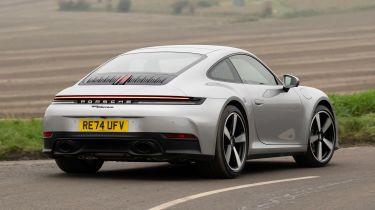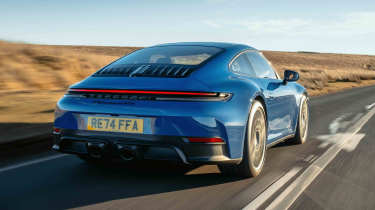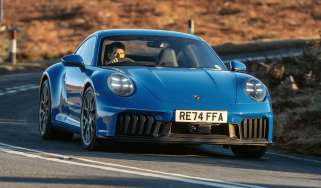Porsche 911 review - Engines, drive & performance
The Porsche 911 is still one of the very best sports cars on sale, regardless of which model you choose
The Porsche 911 has a long history of being rewarding, engaging and great fun to drive, with more modern iterations refining this experience to suit drivers of all abilities. The fundamental design of the 911 is idiosyncratic: it has a flat-six petrol engine mounted in the back of the car, rather than in the front or the middle, as per most conventional sports cars. Though this layout sounds counter-intuitive, Porsche has refined the recipe to provide great traction in all conditions, light, communicative steering, and huge reserves of grip.
The latest 911 is the best it’s ever been from behind the wheel. It’s still the benchmark in its class for enthusiastic drivers, with supercar-rivalling performance, reassuringly predictable handling and remarkable on-track ability. Rivals like the Audi R8 and Aston Martin Vantage may go about their business with more drama, but the 911 remains top of the class as an all-rounder. The GTS offers a more focused driving experience than the entry-level Carrera models without being too firm for British roads, while the Turbo versions are hugely capable supercars with enough comfort for cross-country road trips. The pinnacle of the range is the GT3 version, which will dismantle almost any other rival around a challenging race track, but this does give it a hard-edged feel on the road.
More reviews
The current 911 range uses electric power-steering that offers best-in-class communication, consistency and accuracy; placing the car exactly where you want is easy and you’re never left wondering how much grip is available. The steering is also quicker than before, meaning the car feels a bit more lively than the outgoing model.
Fitted with optional PASM adaptive dampers, the 911 deals admirably with flowing, bumpy roads like those found in the UK, seemingly ignoring rough road surfaces. This system can be softened for comfy motorway cruising or tightened for harder cornering, but we are fond of the default setting which strikes a happy balance.
Porsche 911 992.2 petrol engines
The latest 2024 Carrera now produces an impressive 389bhp from its turbocharged 3.0-litre flat-six petrol engine, a small increase thanks to new turbochargers from the outgoing GTS. Coupled with the 911's famous traction – thanks to the rear-mounted engine pushing the tyres into the tarmac – it can sprint from 0-62mph in just 3.9 seconds. It feels incredibly potent and responsive, with a press of the red ‘Sport Response’ button on the steering wheel allowing you to pass slower traffic or zap between corners in the blink of an eye.
The GTS is a compromise between the Carrera and Turbo models, but for the 992.2 facelift it’s grabbing headlines thanks to its T-Hybrid technology. Engine size has been upped to 3.6 litres, and there’s now a single turbocharger with a built-in electric motor that dramatically improves its responsiveness when you hit the throttle, almost completely eliminating any turbo lag. A second electric motor (drawing power from a 1.9kWh battery) sees its combined power shoot up to 533bhp for a 0-62mph of just three seconds.
Such is its complexity that an automatic eight-speed gearbox is the only option, yet Porsche has managed to keep the car’s overall weight down to its target of around 1,600kg. The result is an engine that feels like a bigger, normally aspirated motor, with heaps of instant acceleration on tap every time you flex your right foot. Not only is it incredibly fast, it’s also usable and you can make minute power adjustments while cornering without upsetting the car’s balance. It sounds good too, with an active exhaust system that provides a characterful flat-six soundtrack in its Sport setting, and even the odd whir from the hybrid setup that reminds you the GTS is packed with technology.
Porsche 911 Carrera T
We’ve also driven the Porsche 911 Carrera T model which arrived in 2022 as a more driver-focused variant. Despite a slightly slower 0-62mph time than the base Carrera (0.3 seconds slower, in fact) it’s one of the best models you can go for if you’re a keen driver. The reason for that slower acceleration time is the Carrera T’s standard manual gearbox – while it’s not as quick as the PDK automatic unit, it’s much more engaging to drive, which is one of the main USPs of the Carrera T.
The driving feel of the T is brilliant, with steering, gearshifts and even the pedal feel nicely weighted, and there’s lots of feedback through the seat of your pants. With no rear seats as standard in the Carrera T, there’s more engine and turbo noise than in the standard car, but again that will be part of the draw for its intended audience. Ride and suspension settings can be tweaked, but we’d say that putting it into its firmest Sports Plus mode doesn’t improve the driving dynamics enough to warrant the extra discomfort of the stiffened suspension – happily, putting the car into ‘Sport’ mode keeps the suspension settings normal unless you stiffen them with a toggle on the dash.
Although the Carrera T costs just a little more than the base Carrera, the T would be our choice over the two, and even perhaps over the more powerful and more expensive GTS.
992.1 Carrera S and Carrera 4S
Both the Porsche 911 Carrera S and Carrera 4S use the same 444bhp twin-turbocharged flat-six petrol engine. It propels the rear-wheel drive Carrera S from 0-62mph in 3.7 seconds, while the Carrera 4S takes just one-tenth less at 3.6 seconds. Top speed is 190mph for the 4S, or 191mph for the S, and careful tuning means it sounds more exciting than before.
When fitted with the optional Sports Chrono Package, 0-62mph times for the Carrera models drop by two-tenths of a second across the board, thanks to a launch control system and faster gearshifts for the eight-speed PDK dual-clutch gearbox. The S and 4S are now available with a seven-speed manual gearbox. In one way this doesn't make much sense – it's 0.7 seconds slower from 0-62mph – but there's an undeniable boost to the interaction between the car and driver.
Improvements to the manual gearbox mean it has a crisper feel than before, and as in the Porsche 718 Cayman and Boxster, software perfectly matches the engine and road speed when you downshift in the Sport or Sport Plus drive modes, for a smooth downshift. Yet it's not these objective improvements that matter most but the subjective change in feel the manual gives the 992. From behind the wheel it feels like a more traditional 911, and to our ears it even sounds better and more satisfying as you accelerate through the gears.
The performance on tap from the 3.0-litre flat-six is fantastic, regardless of which of the car’s eight gears you’re using. There’s plenty of low-down and mid-range punch, while revving the engine out results in truly rapid progress and a fantastic exhaust note. In fact, the performance on show is akin to that found in the previous-generation 911 GTS.
Unless you regularly tackle snowy alpine roads, the two-wheel drive Carrera S has more than enough grip and traction on offer in all conditions. Less weight and a lower asking price mean choosing this 911 is easy. It also has a clever 'Wet' driving mode, that makes the two-wheel drive S feel almost as capable as the four-wheel drive 4S when squeezing the throttle out of sodden corners.
Porsche 911 Dakar
Using the 991 GTS as the base car, the 911 Dakar was a unique new entry into the lineup. Taking past 911 rally cars as its inspiration, the suspension has been toughened up and made 50mm taller, while the car’s lower bodywork has also been made more resilient to fend off knocks. There are two driving modes: ‘Rallye’ and ‘Offroad’, which put the car into attack mode or softer, more progressive settings respectively. Its ability to go anywhere is truly remarkable, yet somehow, the Dakar also manages to feel remarkably close to the GTS when driving on paved roads.
Porsche 911 GT3, GT3 RS and S/T
As is tradition, the 911 GT3 goes without a turbocharger in favour of a naturally aspirated 4.0-litre six-cylinder petrol engine that revs to a scintillating 9,000rpm. It officially gets from 0-62mph in 3.4 seconds with a PDK gearbox but a manual is also available. It has a 198mph top speed.
Power is only up by 10bhp over the previous GT3 but it wasn’t the priority in the development of the latest version. Instead, Porsche has made radical changes to the suspension and aerodynamics, and the result is a staggering 17-second improvement on its time around the famous Nurburgring Nordschleife circuit. A huge rear wing with 'swan neck' style struts helps the GT3 gain 50 to 150% more downforce, depending how it's adjusted by the owner.
The most notable single change is a double-wishbone front suspension setup, for the first time in a 911. This elevates front grip to a new level and has allowed Porsche to make the suspension much stiffer, without ruining ride comfort. It exudes stability and confidence on track, with gear changes that are so fast and smooth, they allow the driver to shift in a corner without upsetting the car's balance. Optional carbon-ceramic brakes provide incredible stopping power with feel. Everything comes together to make the GT3 the closest thing to a racecar without actually buying one.
Above this sits the Porsche GT3 RS, which increases power to 518bhp through the seven-speed PDK automatic gearbox and adds even more outlandish aerodynamic additions. Everything comes together to make the GT3 RS the closest thing to a racecar without actually buying one.
The 911 S/T comes with a version of the GT3 RS’s 4.0-litre naturally-aspirated engine with a short-ratio six-speed manual transmission. It produces 518bhp, does 0-62mph in 3.7 seconds, and goes on to a top speed of 186mph.
Which Is Best?
Cheapest
- Name2dr PDK [4 Seat]
- Gearbox typeSemi-auto
- RRP£106,695
Most Economical
- NameGTS t-Hybrid 2dr PDK
- Gearbox typeSemi-auto
- RRP£140,875
Fastest
- NameGTS t-Hybrid 2dr PDK
- Gearbox typeSemi-auto
- RRP£140,875











